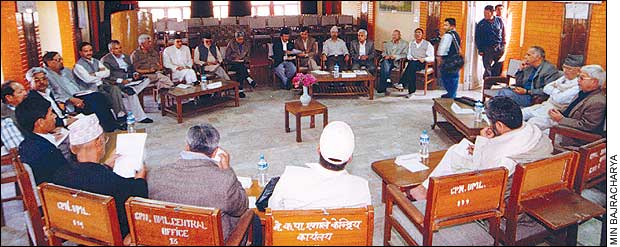

Everything is on hold. The political parties are trying to remain united, while the palace tries to woo them away for a cabinet expansion. Distrust on both sides is high: the king wants to rescue Nepal from what he sees as a bunch of bunglers, senior political leaders see the danger of a return to the days of absolute monarchy.
Who will blink first? The fractious political parties have forged unprecedented unity to oppose the king's move, but they are still torn by mistrust. The Koirala Congress, for instance, has not allowed the Deuba Congress to participate in the all-party meetings, saying it is the only Congress. Koirala wants parliament to be reinstated, since it would mean his party would probably reunite, and he'd call the shots again. The leftist Nepal Workers' and Peasants' Party and the United People's Front are with the Congress on this, because they would get their seats back.
But the UML, which would not benefit from reinstatement, is sticking to its demand for the formation of an interim government under Article 128 of the constitution, in which it would be an equal partner. The political parties are so caught up in ensuring their own existence, they have no time to think about the nation, people, democracy, constitution, or elections. Unless the emergency is reinstated, or there is a crackdown on press freedom (a proposal in the first cabinet meeting last week to this effect was reportedly rejected), it is unlikely the political parties will find common cause.
The king poached Lokendra Bahadur Chand from the centre-right RPP and Badri Prasad Mandal from the tarai-based Sadbhavana Party for the interim cabinet, and both parties are expected to go over to the king's side sooner or later. By bringing in a pro-madhesi Mandal and janajati leader Gore Bahadur Khapangi, the king may have tried to coopt them, but this move is fraught with the dangers of communalism.
Ten days after the nine-member interim government was formed, the cabinet has met only twice. To get going, it needs clarity on its terms of reference in trying to fulfil the king's mandate: ensuring peace and security, streamlining bureaucracy, controlling corruption, delivering services, and preparing for elections. There are questions about who is really in charge. Chand, who's been in this post three times before, is called a "non-starter" prime minister. There are already jokes about "OK-endra Bahadur Chand".
Suddenly, no one is talking about elections. The political parties seem secretly relieved at their postponement, and the interim government has passed the buck to the parties. Only the donors and India still seem keen on polls. That India waited ten days to officially greet the prime minister is taken as a sign that New Delhi had misgivings. Indian Information Minister Sushma Swaraj underlined her country's support Wednesday for a constitutional monarchy and multiparty democracy.
King Gyanendra is keeping his cards close to his chest. Is the palace conducting behind-the-scenes bargaining with the Maoists? Will they agree on a constituent assembly in exchange for berths for Maoist representatives in the interim cabinet? The king's cabinet appointees have been remarkably soft on the Maoists, never using the "t" word, addressing them in honorific Nepali, and saying that the insurgency needs a political solution.
If there are secret contacts, we can expect an escalation of violence near the Maoists' 11-13 November strike as the rebels try to improve their bargaining position. The military would like to exert more pressure on Maoist strongholds, but there are no signs of the promised rifles, helicopters and transport aircraft from abroad.
Does the king really have a trump card, or not? Either way, we'll know by December.


